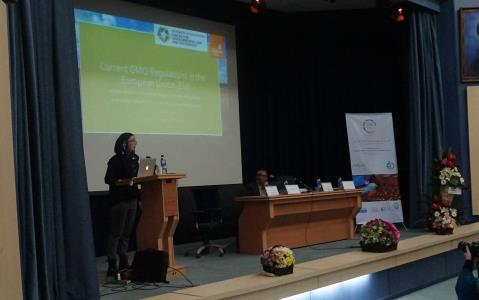SCELG in the Middle East
Miranda Geelhoed presents to competent authorities in Iran on the regulation of GMOs
16 December 2016, SCELG’s PhD Candidate Miranda Geelhoed was invited to present on the EU’s regulation of genetically modified and organisms and the integration of socio-economic considerations in the regulation of GMOs at a two-day conference organised by Parsian Biotech and the Iranian Food and Drug Administration, at the Shahid Beheshti University in Teheran, Iran.
Transboundary knowledge exchange and capacity-building on biosafety
The interdisciplinary conference offered an opportunity for Iranian government officials, scientists and other stakeholder to be informed about the current developments and challenges in the field of agricultural biotechnology and a platform for transboundary knowledge exchange and capacity-building on biosafety. In this context, Miranda Geelhoed, together with Apolline Roger (University of Sheffield), who was unable to attend the conference, prepared two presentations on the EU’s regulatory framework on GMOs and the integration of socio-economic considerations in decision-making on GMOs.
Miranda’s presentations provided an overview of EU risk-assessment and risk-management procedures and legislation on labelling, public information and participation and coexistence, as well as an insight into the role of socio-economic considerations in two exemplary regulatory models on GMOs: the EU and Norway. Discussions afterwards focused on cultivation restrictions in the EU public awareness and perceptions on GMOs in Iran.
Practice-led Research
Miranda Geelhoed is a PhD candidate at the Strathclyde Centre for Environmental Law and Governance. Her research focuses on the interactions between EU and international biodiversity and agricultural laws and the integration of agroecological principles. She has done extensive research in the field of the regulation of GMOs and is currently also actively involved in SCELG’s consultancy to the CBD Secretariat on the mainstreaming of biosafety into cross-sectoral and sectoral legislation, policies and institutional frameworks.


